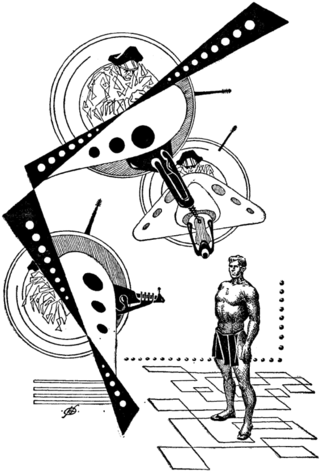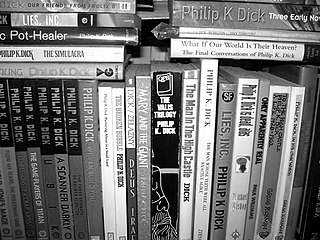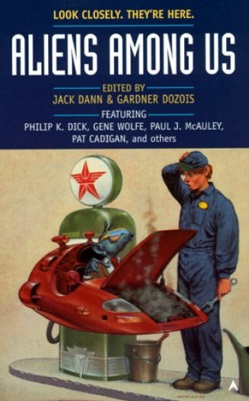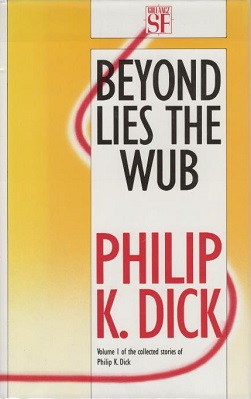Related Research Articles

Philip Kindred Dick, often referred to by his initials PKD, was an American science fiction writer and novelist. He wrote 44 novels and about 121 short stories, most of which appeared in science fiction magazines during his lifetime. His fiction explored varied philosophical and social questions such as the nature of reality, perception, human nature, and identity, and commonly featured characters struggling against elements such as alternate realities, illusory environments, monopolistic corporations, drug abuse, authoritarian governments, and altered states of consciousness. He is considered one of the most important figures in 20th-century science fiction.
"Second Variety" is a science fiction novelette by American writer Philip K. Dick, first published in Space Science Fiction magazine, in May 1953. Set in a world where war between the Soviet Union and United Nations has reduced most of the world to a barren wasteland, the story concerns the discovery, by the few remaining soldiers left, that self-replicating robots originally built to assassinate Soviet agents have gained sentience and are now plotting against both sides. It is one of many stories by Dick examining the implications of nuclear war, particularly after it has destroyed much or all of the planet.
"The Father-Thing" is a 1954 science fiction short story by American writer Philip K. Dick. The story, told through third-person narration but focusing on the child, concerns the replacement of a boy's father with a replicated version. At first, only the child sees the difference and has to recruit other children to help him reveal the truth. The story is typical of Dick's short stories of the period.

"The Golden Man" is an 11,600-word science fiction short story by American writer Philip K. Dick. It was received by the Scott Meredith Literary Agency on June 24, 1953, and first published in the April 1954 issue of If magazine. The story was illustrated by Kelly Freas in its original publication. The story is set in a post-apocalyptic future where the existence of potentially powerful mutants has become a reality. The mutants are seen as dangerous and have been hunted to death by human beings for years. A golden-skinned mutant called Cris is captured by the government, which attempts to execute him. However, his appearance and abilities to see into the future allow him to escape.
"Sales Pitch" is a science fiction short story by American writer Philip K. Dick, first published in Future Science Fiction magazine, June 1954. The premise is the omnipresent, intrusive and even aggressive advertising and marketing. At the end of the story, the protagonist is driven mad by a robot who can forcefully market himself, and refuses to take no for an answer. The subject was of concern to Dick, and features in his early works such as The Man Who Japed.
"The War with the Fnools" is a science fiction short story by American writer Philip K. Dick. It was first published in Galaxy magazine in 1969.
"Explorers We" is a science fiction short story by American writer Philip K. Dick. First published in Fantasy and Science Fiction magazine, January 1959. "Explorers We" was reprinted as a limited edition booklet to commemorate Dick's appearance at the Second International Festival of Science Fiction at Metz, France, September 1977. It was written in 1958, one of only two short stories that Dick wrote in the seven years between 1956 and 1962.
"The Exit Door Leads In" is a science fiction short story by American writer Philip K. Dick. First published in 1979.
"Roog" is a science fiction short story by American writer Philip K. Dick. It was his first sold work, although not his first published story.
"Rautavaara's Case" is a science fiction short story by American writer Philip K. Dick. It was first published in 1980 in Omni magazine and subsequently in the 1985 short story collection I Hope I Shall Arrive Soon. The story was also included on We Can Remember It For You Wholesale, volume five of the Collected Short Stories of Philip K. Dick in 2003.

The bibliography of Philip K. Dick includes 44 novels, 121 short stories, and 14 short story collections published by American science fiction author Philip K. Dick during his lifetime.

Aliens Among Us is a themed anthology of science fiction short works edited by American writers Jack Dann and Gardner Dozois. It was first published in paperback by Ace Books in June 2000. It was reissued as an ebook by Baen Books in October 2014.
"Not by Its Cover" is a science fiction short story by American writer Philip K. Dick, a "loose sequel" to his first published science fiction short story, "Beyond Lies the Wub". The story continues the former's theme of immortality, although not focusing on a living Wub itself, but rather its fur.

A Handful of Darkness is a collection of science fiction and fantasy stories by American writer Philip K. Dick. It was first published by Rich & Cowan in 1955 and was Dick's first hardcover book.

The Best of Philip K. Dick is a collection of science fiction stories by American writer Philip K. Dick. It was first published by Del Rey Books in 1977 as a volume in its Classic Library of Science Fiction. Many of the stories had originally appeared in the magazines Planet Stories, Fantasy and Science Fiction, Space Science Fiction, Imagination, Astounding Stories, Galaxy Science Fiction, Amazing Stories, Science Fiction Stories and Startling Stories, as well as the anthologies Dangerous Visions and Star Science Fiction Stories No.3.

The Collected Stories of Philip K. Dick is a collection of 118 science fiction stories by American writer Philip K. Dick. It was first published by Underwood-Miller in 1987 as a five volume set. See Philip K. Dick bibliography for information about the mass market reprints.

Beyond Lies the Wub is a collection of science fiction stories by American writer Philip K. Dick. It was first published by Gollancz in 1988 and later comprised Volume I of The Collected Stories of Philip K. Dick. Many of the stories had originally appeared in the magazines Fantasy and Science Fiction, Planet Stories, If, Galaxy Science Fiction, Imagination, Space Science Fiction, Fantastic Story Magazine, Amazing Stories, Future, Cosmos, Fantasy Fiction, Beyond Fantasy Fiction, Thrilling Wonder Stories, Startling Stories. The collection was reprinted by Citadel Press in 2003 under the title Paycheck and Other Classic Stories.

The Short Happy Life of the Brown Oxford is a collection of science fiction stories by American writer Philip K. Dick. It was first published by Citadel Twilight in 1990 and reprints Volume I of The Collected Stories of Philip K. Dick. Many of the stories had originally appeared in the magazines Fantasy and Science Fiction, Planet Stories, If, Galaxy Science Fiction, Imagination, Space Science Fiction, Fantastic Story Magazine, Amazing Stories, Future, Cosmos, Fantasy Fiction, Beyond Fantasy Fiction, Thrilling Wonder Stories and Startling Stories. The collection was reprinted by Citadel Press in 2003 under the title Paycheck and Other Classic Stories.
Expendable is a novel by James Alan Gardner.
"The Great C" is a science fiction short story by American writer Philip K. Dick, first published in Cosmos Science Fiction and Fantasy Magazine in 1953. It has since been republished several times in collections such as Beyond Lies the Wub in 1988. Parts of the work, along with Planet for Transients, were later used in the full-length novel Deus Irae. The story is set in a post-apocalyptic world in which a young man is sent from his tribe every year to visit a godlike computer capable of mass destruction and try to stump it with three questions. The story was adapted into an animated virtual reality film in 2018 by Secret Location.
References
- ↑ Philip K. Dick. The Collected Stories of Philip K. Dick, Volume 1: The Short Happy Life of the Brown Oxford. Citadel Press. 1987. p 403.